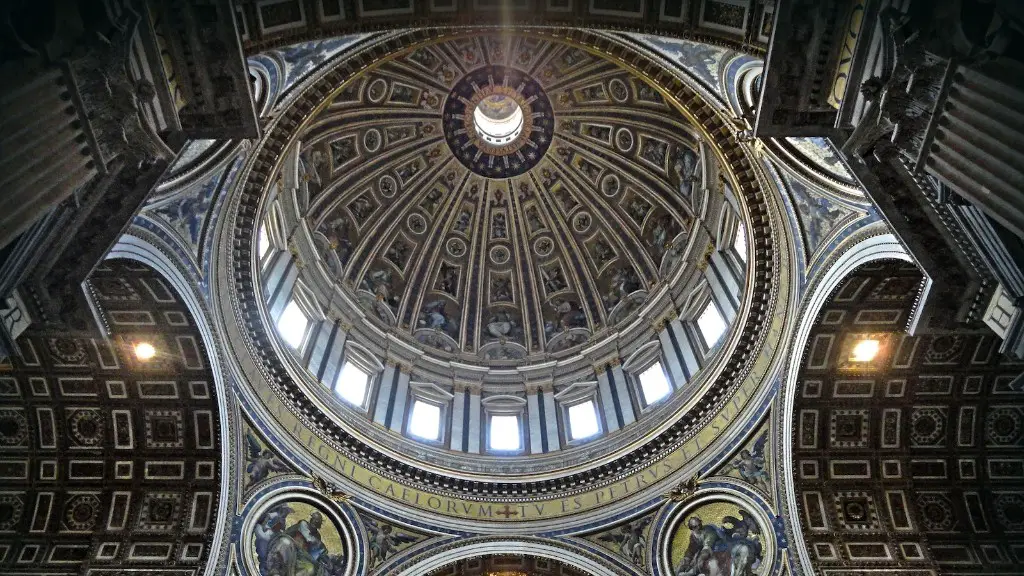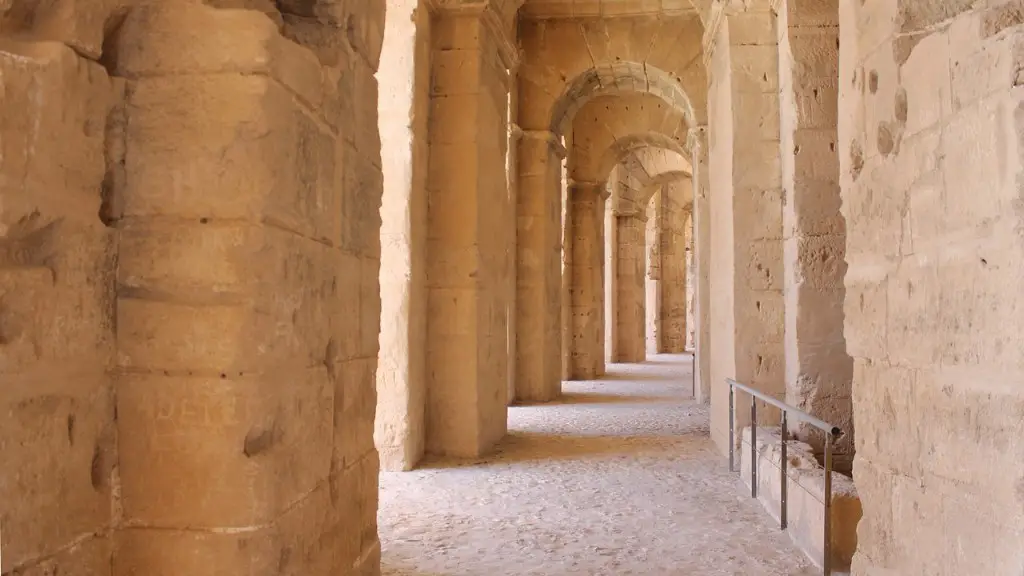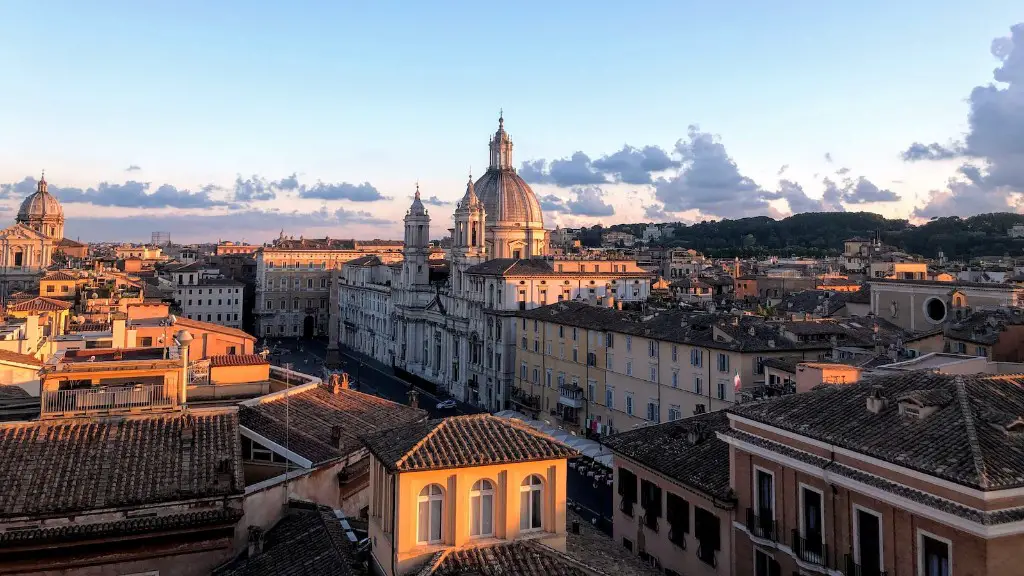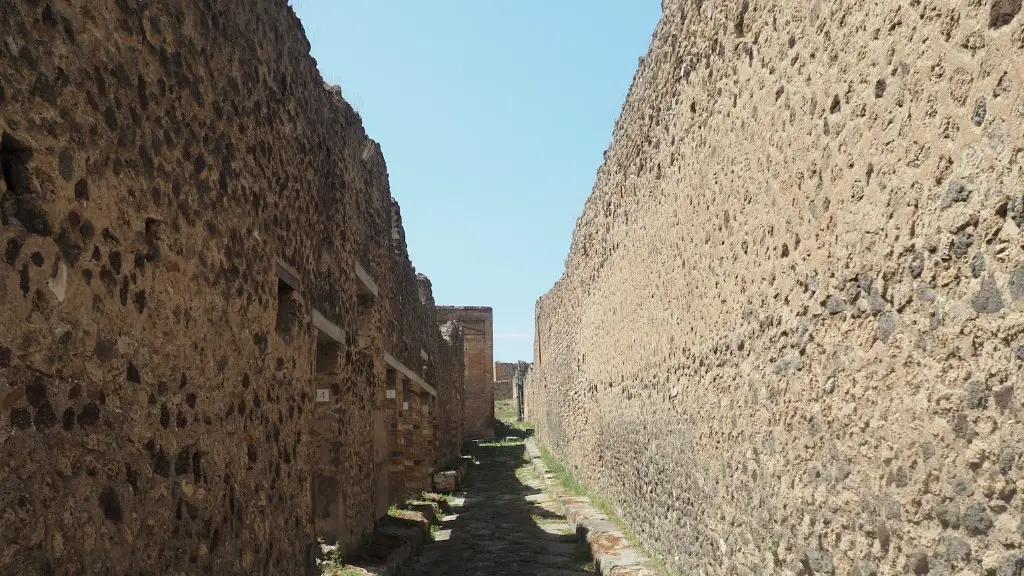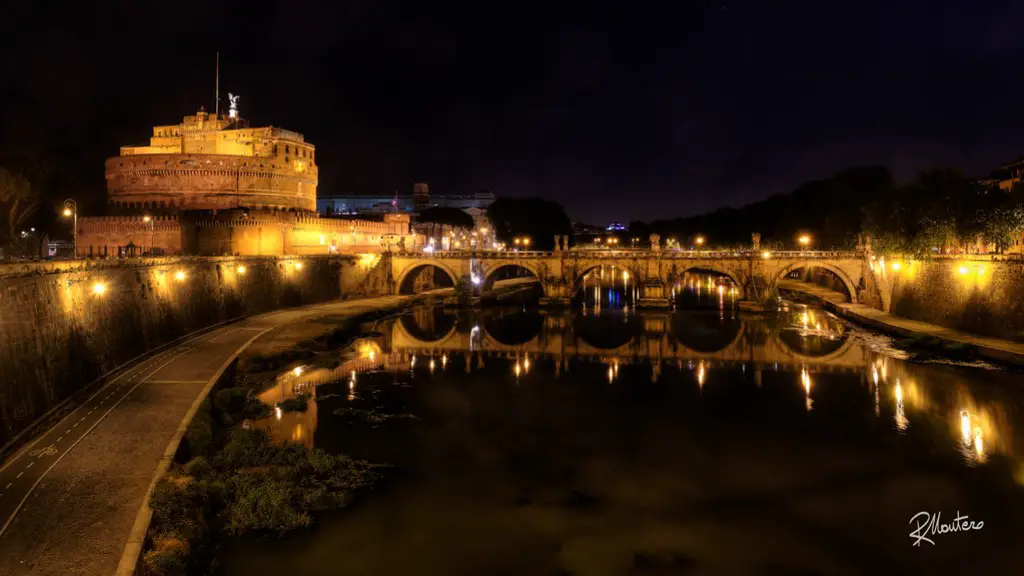The Ancient Romans practised an elaborate range of religious beliefs and rites, intertwined with traditional folk beliefs that evolved into what is known as the Roman religion. Roman religion was centred around gods and goddesses, ritual sacrifice and ritualistic ceremonies, which were held in temples or shrines. The Romans believed in the power of the gods, and in their ability to influence and control every aspect of their lives, including health, fertility and success.
For centuries, the Roman people worshipped the gods of Greece but eventually they started to develop their own pantheon of gods and goddesses. The most important gods included Jupiter, Juno, Mars and Minerva. Jupiter, the king of all gods, was the god of thunder, law and order. Juno was the goddess of marriage and childbirth. Mars was the god of war and Minerva was the goddess of wisdom. There were also other gods, such as Neptune, Vulcan and Diana, who had lesser roles to play.
The Ancient Romans believed that these gods could be appeased and persuaded to help them with their everyday needs, and so elaborate rituals were devised through which the gods could be contacted. They also saw gods in every aspect of life, from natural phenomena like rain and thunder to forces such as fate and luck.
Like their ancestors, the Ancient Romans believed that the gods were capable of controlling their destiny and the events of their life. They believed that the gods could influence their health, their successes, their protection from danger and even their relationships. As such, they made offerings of food and gifts to the gods in order to gain their favour, and they sought the help of Roman augurs and haruspices to interpret signs sent by the gods.
Sacrifices to the gods were an important part of Roman religion. Offerings were made of animals, grain, fruits and vegetables and sometimes even human sacrifices. These offerings were carried out in special religious ceremonies, with priests officiating and offering prayers to the gods.
The Ancient Romans had an elaborate system of rituals and beliefs, in which the gods played an important role. These beliefs helped to shape the Roman culture and religion, and still influence our modern understanding of religion today.
God Participation
The Ancient Romans believed that gods participated in their own lives. They believed that by participating in rituals and offerings, gods could accept and respond to the worship of their people. This was often called ‘the cult of the gods’, and was believed to be an integral part of maintaining a healthy relationship between gods and mortals.
In some rituals, the worshippers would stand in a circle, while the priest or sacrificer offered prayers or sacrifices to the gods on behalf of the worshippers. This allowed the gods to hear and answer the prayers of the people, and it was believed that gods would grant favours to those who made offerings and prayers on their behalf.
Ancient Roman religious ceremonies were often held in public spaces, such as fora and temples, or in large scale events such as festivals and games. The Roman people also believed that the gods could intervene in the affairs of the state, and so public ceremonies were often held to thank the gods for some divine favour, or to request their assistance in the event of disaster or difficulty.
The worshipping of gods was a central part of the Ancient Roman religion, and it was believed to be necessary for a healthy, successful life.
Divine Action
The Ancient Romans believed that gods could directly influence their lives, either by offering assistance or by punishing transgressions. This was known as divine action, and was seen as a way for gods to stay in contact with their worshippers, and to express their feelings towards them.
The Ancient Romans believed that gods were capable of listening and understanding the prayers, offerings and sacrifices of their worshippers and that they could provide assistance when it was needed. Thus, they offered sacrifices in order to gain favour from the gods, and prayed to them in times of need. This divine action was also believed to provide protection, and it was thought that if a person did something to anger the gods, the gods could use their power to punish them.
The Ancient Romans also believed that divination, or the practice of predicting the future, was connected to their religion. This was seen as an important way for the gods to communicate their wishes and plans to the people. They believed that priests were able to interpret the signs sent by the gods and interpret them, providing guidance or warnings to the people.
Divine action was an important part of Ancient Roman religion, and the belief that gods could offer assistance and protection helped to shape their culture and religion.
Religious Practices
The Ancient Romans had a number of religious practices designed to maintain a connection with the gods. In addition to offering sacrifices, prayers and other religious ceremonies, they also believed in augury, or the interpretation of signs sent by the gods. This would be done by a priest, who would interpret the signs and interpret them for the people.
The Romans also engaged in various forms of divination, such as haruspicy and astrology. Haruspicy was the practice of predicting the future by examining the entrails of sacrificed animals, while astrology was the practice of interpreting the movements of the stars and planets. Both practices were believed to be ways of understanding and interpreting the will of the gods.
Finally, the Ancient Romans also believed in festivals, games and contests that were in honour of their gods. These were seen as important ways of connecting to the gods and of cultivating a healthy relationship with them.
Ancient Roman religious practices were an important part of their culture, and these practices still influence our own understanding of religion today.
Festivals and Rituals
Festivals and rituals were an important part of the Ancient Roman religion, and they served as a way to honour the gods and ask for their favour. Some of the most important festivals included the Saturnalia, the Lupercalia, the Vestalia and the Plebeian Games. The Saturnalia was a winter festival dedicated to Saturn, the god of agriculture. The Lupercalia was a spring festival dedicated to the fertility gods, and the Vestalia was a festival dedicated to Vesta, the goddess of the hearth. Finally, the Plebeian Games were athletic contests held in honour of the gods.
The Romans also celebrated a number of other festivals and rituals. The most important of these was the annual calendrical festival, which was held during the month of March, and was a celebration of the beginning of a new year. This festival symbolized the death and rebirth of nature and was seen as a way of reaffirming the cycle of life and death.
The Ancient Romans also held special purification rituals in order to re-establish a connection with their gods. These ritual also served to purify the land, the city and the people from all impurities.
Religious festivals and rituals were an important part of life for the Ancient Romans, and their celebration of these rituals still influences our own religious practices today.
Places of Worship
The Ancient Romans had several important religious sites for worshipping their gods. The most important and well known was the Temple of Jupiter on the Capitoline Hill in Rome. This was the home of Jupiter, the king of the gods, and was a place of great religious significance. Other temples were also dedicated to the gods, such as the Temple of Vesta, the Temple of Mars, the Temple of Apollo, and the Temple of Venus.
In addition to temples and shrines, the Ancient Romans also had other places of worship, such as groves, sacred lakes and caves. These sites were seen as places where gods could dwell and be honoured, and were considered to be highly sacred by the Ancient Romans.
Places of worship were an important part of Ancient Roman religion, and these locations still have a spiritual significance today.
Legacy
The Ancient Roman religion had a profound influence on Western culture as a whole. It was the religion of the pre-Christian Roman Empire, and it continued to have a strong influence on the Roman world even after the adoption of Christianity.
The gods and goddesses of the Roman religion still remain a part of the Western cultural landscape, and their iconic figures and symbols are still seen in everyday life. The Ancient Roman religion also provided the basis for modern religious practices and an understanding of the forces of nature. Finally, it helped to shape how we understand the relationship between gods and mortals, and the power that each holds over the other.
The Ancient Roman religion is an important part of our history, and it has shaped our modern understanding of religion and the world around us.
